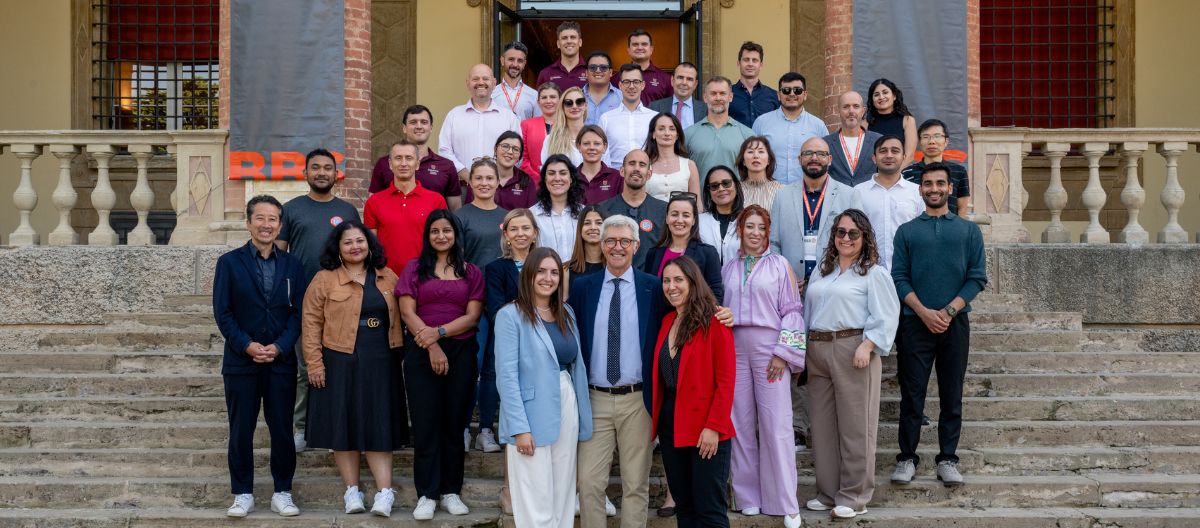
International week: BBS welcomes International Business Schools within the EMBA Consortium
26 September 2025Bologna Business School hosted the Executive MBA delegation from International Business Schools as part of the EMBA Consortium, offering a one-week experience that combined on-campus learning with visits to companies symbolic of Made in Italy.
An intense and international program, designed to foster dialogue between academia, culture, and business.
The days unfolded through classroom sessions, workshops, meetings with Alumni and managers, as well as company visits to leading Italian firms such as Tetra Pak, Ducati, and Italpizza. A wide range of experiences that allowed participants to engage directly with the Italian business landscape and the values that underpin it.
a unique environment for global learning
Yuichi Terada, KEIO Student who took part in the International Week, described Bologna Business School as “a truly inspiring academic environment, rooted in the legacy of the University of Bologna, the oldest university in the world, and enriched by Italy’s Renaissance heritage. The historical elegance of Villa Guastavillani, combined with the modern and dynamic atmosphere of the new campus, creates a unique setting for global learning.”
According to Terada, the week in Bologna represented a concrete example of internationalization: “the International Week attracts a diverse cohort of professionals from across the globe. This cultural and intellectual diversity — spanning nationalities, religions, professional backgrounds, and life experiences — fosters an exchange of ideas and perspectives that is stimulating and enriching.”
the value of corporate partners
A central role was played by the corporate partners. Terada emphasized how “the exceptional hospitality extended by each company was a testament to the strong, collaborative ties between BBS and its corporate partners.”
What impressed him the most was the openness shown by the senior managers he met: “senior managers demonstrated genuine enthusiasm to engage with us, creating fertile ground for meaningful dialogue and knowledge exchange. Moreover, the integration of Italian cultural values — such as craftsmanship, community, and tradition — into corporate ethos was striking.”
The visits therefore offered not only business insights, but also a deeper perspective on how Italian cultural heritage shapes organizational identity and decision-making.
reflecting on leadership in a complex world
The International Week was also an opportunity to reflect on leadership in global and multicultural contexts. Terada explained: “this experience in Italy has profoundly enhanced my Executive MBA journey, expanding my global perspective and deepening my understanding of leadership in a multicultural context. In today’s world, defined by volatility, uncertainty, complexity, and ambiguity, effective leadership requires vision, empathy, and adaptability.”
The chance to engage with peers from different backgrounds strengthened his belief in the need for forward-looking leadership, capable of transcending national borders and co-creating sustainable solutions: “the insights, relationships, and shared experiences gained in Italy will continue to inform my leadership approach and contribute meaningfully to my professional growth.”
the most important lesson
The most valuable lesson Terada carries with him concerns the importance of international collaboration rooted in cultural authenticity: “the most profound takeaway from my experience at Bologna Business School is the power of global collaboration rooted in cultural authenticity.”
On a personal level, inspiration came from Italy’s cultural heritage and the warmth of its people: “the friendships forged, the stories exchanged, and the shared commitment to lifelong learning have reminded me that growth is not just about acquiring knowledge, but about embracing humanity. This experience has reinforced my belief that meaningful leadership begins with genuine connection and a willingness to learn from others.”
The International Week offered a week of genuine dialogue between cultures, companies, and people, creating value that goes beyond the classroom and contributes to both professional and personal growth.
